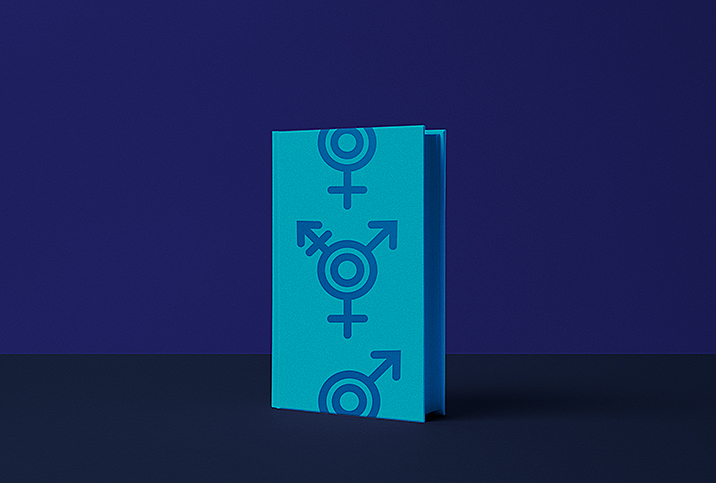What Does It Mean to Be Intersex?

Historically, having autonomy over their identity, body and experiences is something all too often denied to many LGBTQIA+ people, such as being forced to stay in the closet, constantly ostracized, being sent to conversion camps and more. Intersex people are hit especially hard, as they are frequently subject to surgeries and medical procedures at a very young age to make their bodies fit into a biologically binary male or female role.
Being born intersex
According to Planned Parenthood, current estimates indicate 1 to 2 in 100 people born in the U.S. are intersex. However, this doesn't always mean or look like the same thing.
Bria Brown-King, the director of engagement for InterACT, an advocacy organization for the rights and justice of intersex children and adults, explained what it means to be intersex and how to support and fight for the fair treatment of intersex individuals.
"When we say 'intersex,' we are referring to people who were born with variations or differences in their physical sex characteristics that don't align with society's notion of how a typical male or female body should look," Brown-King explained. "A person can be born with differences in their internal/external reproductive organs, sex chromosomes, and/or their response to or production of hormones."
"There are more than 30 different intersex variations," they added. "These differences can become apparent at birth, during puberty, at adulthood, and there are certainly people who go their entire lives never knowing that they are intersex."
Do intersex children require surgeries?
Physicians often decide at birth—or when a child is very young—whether to proceed with surgeries, procedures or hormone therapies, which aim to align the person with a gender role. These procedures are often exclusively for cosmetic purposes and can cause persisting undue harm and trauma, especially if the recipient is too young to consent.
"The specific surgeries that InterACT advocates against are not medically necessary," Brown-King said. "These surgeries are performed to make the genital appearance or internal reproductive anatomy appear more 'normal.' This includes surgeries performed to move a working urethral opening to the tip of the penis so that a child can pee standing up to adhere to gender norms—creating a vaginal opening so that a child eventually engages in vaginal penetrative sex, reducing the size of an enlarged clitoris to be more socially acceptable, removing working gonads even when they are perfectly healthy and changing the labia or scrotum also to appear socially acceptable."
And again, the arguably unnecessary procedures are typically performed without the consent of the person undergoing the operation because they're too young to understand the decisions being made on their behalf.
"Most of these surgeries are performed on children under the age of 2," Brown-King said. "The procedures have a high complication rate and oftentimes require multiple follow-up procedures."
Conversely, Brown-King explained many intersex advocacy groups support surgeries that are medically necessary.
"If surgery is required to ensure that a child can urinate properly, we support that," Brown-King said. "However, if surgery is performed to solely relocate an already functioning urethral opening to the tip of the penis so that a child can pee standing up, that surgery isn't medically necessary because urine could leave the body before surgery."
They added intersex adults who recieve surgery still report issues with urinary incontinence and vaginal stenosis, which are often risks associated with these nonconsented cosmetic surgeries, such as vaginoplasties.
The psychological impacts of unnecessary surgeries
Aside from potential lifelong physical impacts, mistreatment and judgment from medical professionals, these procedures could impose serious mental and social effects.
"These surgeries do come with lifelong psychological and emotional impacts on intersex children and adults," Brown-King said. "Many intersex youths are forced to undergo repeated genital exams without understanding why. The United Nations considers these surgeries to be a form of torture. Children are forced to have genital surgeries that they grow up to realize they never wanted to begin with."
These repeated instances of trauma add up until they can underpin the day-to-day lives of intersex people.
"A national study was done on intersex adults in the U.S., showing that 53 percent of the participants rated their mental health as fair/poor," Brown-King continued. "The researchers also mentioned that it's hard to recruit intersex participants for these studies due to their experiences of trauma, stigma and exploitation in clinical settings."
How to support intersex individuals
If a loved one shares with you that they are intersex, or if your child is born intersex, there are plenty of ways to affirm and empower them rather than perpetuate shame, judgment, fear or misinformation. The first step is to listen and learn.
"Center the voices of your intersex loved ones," Brown-King said. "Ask them what they need to feel supported and if they want to get connected to intersex support groups. There are also support groups for families/allies in addition to intersex youth and adults. Listen to them and offer reassurance whenever it feels appropriate to do so. Love and support go a long way."


















